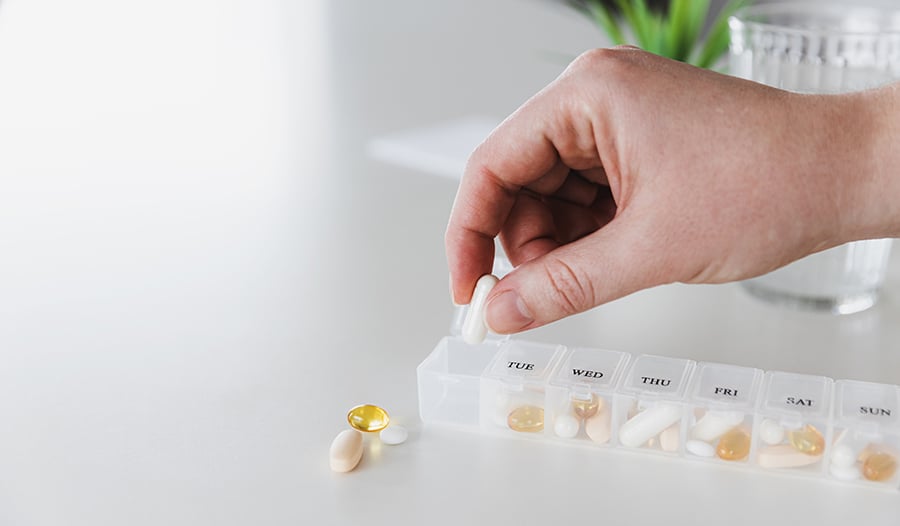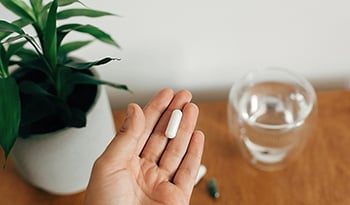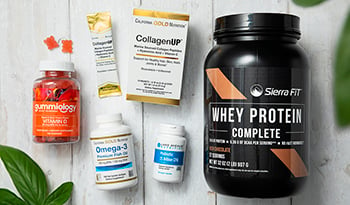Dr. Oz's Personal Supplement Regimen For Optimal Health and Wellness
DISCLAIMER:This blog does not intend to provide diagnosis...
- In this article:
- Ashwagandha
- L-Serine
- Multivitamin + Lutein + Vitamin B
- Omega-3 Fatty Acids

I met my wife 40 years ago and still remember my first walk through her farmhouse kitchen, full of freshly cut herbs from their garden and bowls of vitamins, minerals, and supplements. The study was packed with research papers explaining the benefits of these pills, capsules, and creams. Her father is a world-famous heart surgeon, but her mother sought to keep the family healthy with several daily doses of natural herbs and healthy foods customized to each of the six kids.
My father was also a physician, but our family had followed the book of hard science, so this departure into complementary medicine made me curious. I asked many questions and began to appreciate that numerous lines of research supported much of my in-laws' wisdom. However, the data was not delivered the same way as pharmaceutical research because these inexpensive supplements did not justify the several hundred million dollar price tag for large multi-center randomized trials. Nevertheless, evaluation of small randomized clinical studies, long-lived populations, and anecdotal evaluation of individual patients gave me enough confidence to start taking supplements myself. Equally importantly, my wife was convinced and made vitamin "magic drinks" needed to get the kids (and me) on the program. Instead of throwing all the data we reviewed at you, let me briefly explain my personal regimen.
Ashwagandha
Every morning, I take ashwagandha to help support thyroid health. Ashwagandha has been widely used in Indian Ayurvedic medicine for its calming properties, so it theoretically normalizes our responses to stress.
L-Serine
Right afterward, I take L-Serine, which helps clear misfolded proteins in the brain. Activation of autophagic protein breakdown may contribute to the neuroprotective effect of L-serine, which has been reported in cell culture and early human clinical trials. I take the L-Serine in a tasty powdered mix called MEM Food. Now, Mom and I both ingest a packet every morning.
Multivitamin + Lutein + Vitamin B
I don't take a multivitamin on an empty stomach because the B vitamins can make me queasy. So after my first meal, around 10 a.m., I take my daily multivitamin with efficacious amounts of core supplements customized to my needs. I specifically include lutein since data suggest it supports eye health. I also take methylated B vitamins since I lack the methylation gene and cannot make the vitamin active on my own.
If you are really buttoned up, you know that the water-soluble vitamins will not last a full 24 hours in your body, so taking half the multivitamin dose in the morning and half at night is wise if you have the discipline. But don't lose sleep over the decision.
Omega-3 Fatty Acids
Finally, I take omega-3 fatty acids (EPA and DHA) for the brain protective benefits. These polyunsaturated fats are responsible for most of the brain and mental health benefits of fish oil. Because most people do not consume the recommended amounts of fish, many likely need to ingest more EPA and DHA in their diets. The body can make EPA and DHA out of another omega-3 called ALA, which is found in a number of vegetarian sources, like soybeans, walnuts, flaxseeds, and chia seeds. But most of us cannot efficiently convert ALA to the fats we need, so you are better off taking a supplement. Algae sources of these polyunsaturated fats can make the process even easier.
This is a simple, inexpensive regimen helps me feel my best, especially when I add my other lifestyle basics, like exercising most days and meticulous attention to my sleep.

 By Dr. Mehmet Oz, M.D.
By Dr. Mehmet Oz, M.D. 


